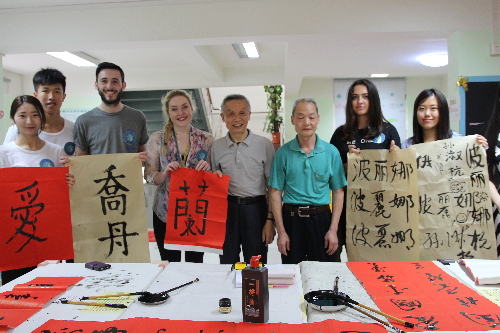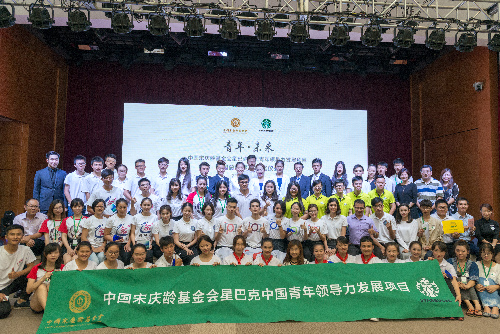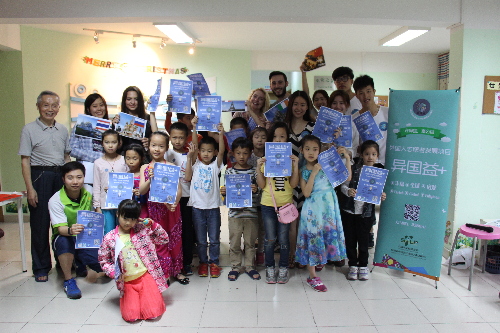Public Services Bolster Youthful Growth
By staff reporter ZHOU LIN
WE don't want to try to move the public to tears with miserable stories. Doing volunteer work in social services can be enjoyable, relaxed and rewarding!" Xie Feixun, founder of the E.G.E. program and student at Huanan Normal University explained. "Our program acronym stands for Enrich, Global, and Enlighten, which reflects our original idea."
Share Happiness
Guangzhou is an international metropolis whose 13 million or so population includes a considerable number of foreign students. Young people who have had volunteering experience in their home countries are eager to participate in China's public services. It gives them the chance to help local people and at the same time learn about Chinese culture and civil life. This is extremely helpful in certain low-income communities where many people live on the minimum living security allowance. Families in such communities cannot afford to send children to foreign language classes, so their kids have little opportunity to learn about the greater world.
"Our program aims to build a platform for both altruistic foreign students and local residents. E.G.E. Plus means working as volunteer in a foreign country. The plus element is relevant to anyone who feels they can come up with good ideas or propose colorful, interactive events."
Xie Feixun is strategic director of the original five member team. The research its members carried out in five Guangzhou colleges revealed that there are more than 10,000 overseas students living in the southeastern province. The E.G.E. poster drew responses from 450 eager volunteers, 350 of them foreigners and 100 Chinese.

The E.G.E. program provides a two-way service. Chinese volunteers introduce foreign students to Chinese communities, where they learn traditional Chinese arts like calligraphy, traditional Chinese painting, paper-cutting, Cantonese Opera, and traditional handicrafts like rattan weaving. Foreign volunteers, meanwhile, participate in community services, for instance by holding English salons for children in households on subsistence allowances. There they learn oral English, and have classes in creative thinking, so providing them with a broader global vision.
Last April was when volunteers first came to Jinshazhou in Guangzhou, the largest indemnificatory housing community. There senior residents tutored overseas students in Chinese calligraphy. Local residents were so happy with their creative idea that they composed a couplet with a volunteer's name Ailan incorporated, so to express their good wishes to foreign friends. The children organized a talent show in which they performed on traditional Chinese musical instruments such as the Hulusi (gourd pipe) and guzheng (Chinese zither), and also gave folk dancing displays.
"I don't want to play with foreigners because I don't know how to speak English." Although shy at first, local children soon made friends with the foreign volunteers, and both boys and girls joined them in singing English songs, playing games, and learning English words and phrases.
Jordan and Elaine, a couple from Ireland, plan to study in China for one semester. They often take the one-hour subway ride to do volunteer work in local communities. "These children are amazingly gifted in both musical and dancing talent. Teaching them games is truly rewarding," Jordan said. Elaine agreed, "I am delighted to be able to volunteer here in China. These children are blessed with unbelievable talents!" Both Jordan and Elaine work as teachers in their motherland. They would like to take works of calligraphy back to Ireland and so link the hearts of the children of the two nations that are 25,000 kilometers apart.
"I am always touched by the warm exchanges between Chinese volunteers and their foreign partners. Volunteers from different countries with the same goals converge, and no language barrier could possibly dampen our enthusiasm," Xie Feixun said.
To guarantee the sustainability and quality of public services, Xie Feixun and his team have compiled a guide to reading English picture books. After carefully selecting 10 picture stories, they have successfully run five training sessions, all well received. They also devised a course on creative thinking, based on authentic overseas teachings and text books from which they amassed around 50 scientific experiments. One team member regularly updates the section of original sound recordings of English stories that feature in the program's official WeChat account, two new pieces per day.
Not only foreign students and local communities but also E.G.E. team members benefit from the program. Huang Jiaming told China Today, "My oral English was not at all fluent until the program provided me with the opportunity to practice it. I am now much more confident, and feel there are no barriers to my communication with foreigners."
Their understanding of volunteering in public services is that it is enjoyable, relaxed and rewarding, and at the same time they hope to help others learn from others, according to Xie Feixun. "This could be the new model and concept for popularizing social welfare in China," Xie Feixun said.
Inclusive Youth Leadership
Xie Feixun explained that the success of the E.G.E. program depends on sponsorship from the "Starbucks China Youth Leadership Development Program" which gave them their RMB 5,000 initial fund and professional training and guidance.
"This program acquaints us with exactly what youth responsibility is. The initial fund provides us with a solid foundation, while lectures help us understand the core value and future goal of our program, as well as the nature of public services. Roadshows show us the importance of a cooperative team, and exchanges among friends in schools nationwide broaden our horizons," Xie told China Today.
The Youth Leadership Program is jointly sponsored by Starbucks and China's Soong Ching Ling Foundation. It offers Chinese college students a leadership nurturing plan. Starbucks Foundation aims to invest a total US $1.5 million (RMB 9.3 million) in three consecutive sessions that will benefit 1,500 students nationwide, including those from impoverished areas and poor families. The program provides students with opportunities to learn about business wisdom, social cognition, and communication skills. It thus bolsters their growth and further development.

The program has so far successfully held two sessions. The second year featured 100 teams, each of 500 students, from 10 colleges in five cities, including Beijing, Shanghai, Guangzhou, Chengdu, and Changsha. All participated in investigations, onsite practice, and roadshows. They visited 100-plus communities and schools, so helping more than 10,000 people, and received around 110,000 online commendations and 300,000 peer assessments.
The program has generated a good number of pertinent ideas on public services. For instance, the Southwest University for Nationalities team developed a "Youfaner" App which provides a platform for senior citizens and youth to eat together. Young people can order a lunch or dinner on the App that they eat in the company of elderly people living alone. It is a win-win idea, since the youth can get a discount for chatting with the aged or helping with their housework, while seniors can earn additional money from the App revenues in their leisure time. It thus warms "both the heart and stomach." Another program focuses on a facet of China's intangible cultural heritage - natural dyes. Volunteers raise money for charity through selling organically dyed products. They then train young adults in minority regions to act as guides for visitors by explaining to them the processes of making traditional handicrafts. They thus promote tourism.
"Our advice as regards youth leadership is simple - just do it! A group of young people utilize their creative thinking and actions to do good for others. The youth leadership program focuses on young people's influence on others and at the same time helps them to realize their innate value," Xi Feixun said.
Make Love Flow
In early 2016, the China Foundation for Poverty Alleviation (CFPA) released its 2015 report on an investigation into college students' participation in social welfare. It stated that 90 percent of students participated in public services that span donations of cash, goods and blood to voluntary services. Volunteering is the top choice of most students among all available social welfare works. Fifty-eight percent students agreed that China's public welfare undertaking is on the rise, and 35 percent hoped to work in social welfare organizations.
"When we graduate, juniors can follow up. We are also considering market financing to sustain our program." Xie Feixun remarked that the importance of public services lies in perseverance, and hence advocates encouraging students to accept their responsibilities and let their love and trust flow.
In talking about the program's future, Xie Feixun spoke of a plan to interconnect more social resources. For example, they would like to improve the system of foreign volunteer recruitment and voluntary services whereby it gives volunteers feedback. They also wish to cooperate with educational organizations, which are expected to instill them more funds, or put their courses online for fixed fees. Both benevolent, business models are accessible only if they generate social values.
Two 19-year-old German boys left a deep impression on the team. They hope to work as full time volunteers in China during their gap year. "We all admire their courage in suspending their life script to pursue the meaning of life. We are deeply moved by their strong will and persistence, the like of which we have never before encountered."
To realize one's personal value is a piece of cake, but shouldering social responsibility is not that easy. The ultimate goal of the E.G.E. program is to tempt Chinese young people out of their comfort zones to participate in caring for other peoples of the world. They may thus better understand themselves and the world, and eventually grow up alongside great social changes, Xie Feixun said.

